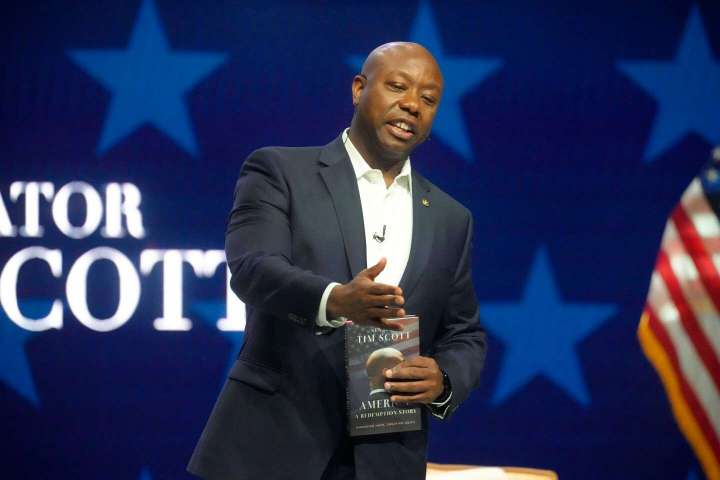Every successful protagonist needs an injury or flaw to overcome. This is essential to storytelling — and winning a reader’s empathy.
Tim Scott’s book of miracles

Another thing you may not know: He was a superstar running back in high school and was bound to play college ball when a car accident ended that dream.
These are but two of many telling details in Scott’s just-published memoir, “America: A Redemption Story.” His tale is a delight to read and clears away some of the brambles concerning Donald Trump, whom he both praises and criticizes, Big Media (well, you can guess), and his own views on race, victimhood and the idea of the United States of America versus the narratives of division so prevalent today.
Though I’ve met Scott on several occasions, he’s a bit of an enigma to me and, likely, to the rest of the country.
Just how did a Black kid raised by a single mom in North Charleston, S.C., his self-esteem daily blunted by his reflection in the mirror, become the handsome politician who bears malice toward none — and whose ability to let water run off his back has made him the envy of ducks?
We’ll start with a minor miracle. At 19, Scott walked into an orthodontist’s office in Charleston, S.C., without an appointment and managed to talk his way into a seat in the dental chair. Could anything be done about his overbite, he asked?
Dr. Monte S. Harrington asked the young man how much he truly could afford to pay for braces, and an agreement was reached: Scott would pay $40/month until his braces came off. No wonder Scott seems always to be smiling.
“America” is an easy read, consisting of short stories about people, events and historic moments that serve as didactic tales. Parables, even. All presumed candidates for high office, especially those eyeing the White House, write books to reveal themselves to the electorate, but few are as readable or inspiring as this one.
Scott introduces us to Madam C.J. Walker, the first self-made Black female millionaire. The daughter and sibling of slaves (she was born after Emancipation), Walker could have been a victim of hair loss but instead decided to fix that. She did the research, experimented, and invented scalp and hair products that are still sold under her name.
Scott’s point: If she can do it, you can do it.
The same can be said of Scott, who grew up poor but benefited from the love of his mother, a nurse’s aide at a hospital, and from his maternal grandparents. He was also the beneficiary of mentors, especially John Moniz, a Chick-fil-A manager who invested $40,000 in Scott’s first insurance business and became a substitute father figure.
As Scott describes our nation’s trajectory, we’re all part of its search for identity and, ultimately, its redemption. But our path forward, he writes, can’t be forged with a victim-oppressor mind-set. Scott believes instead that every person is a potential hero who can harness and transform despair into hope. If he can do it, he writes, you can, too.
That all sounds nice — and lucky, too. But still: Who is he, really? What makes a Southern-bred Black man become a conservative Republican? How could he? Or, as some would have it, how dare he?
Scott chafes at the idea that he’s a token African American for the GOP. After MSNBC’s Joy Reid called him a “patina of diversity” for the Republican Party, Scott wrote that “I would suggest she has a limited view of the capacity of people who look like us.” He’s been called an “Uncle Tim” and fielded vile comments from detractors, including from those who apparently cannot accept a Black conservative. To Scott, the notion that there is only one way to think is as outrageous as any racial epithet.
The guiding light of Scott’s life is his faith in God and the teachings of Jesus Christ. Scott doesn’t proselytize in his book, though he doesn’t shy away from scripture or prayer. Mostly he offers practical advice for living a life of hope. He urges his readers to stop watching the news and reflect instead on what matters most in life. Family first.
Unlike so many committed to perpetuating America’s racial divide, Scott doesn’t focus on the past except as it informs the future. He certainly doesn’t skirt slavery or his experience growing up in the South. He has suffered the same indignities familiar to all minorities — and he bears the same scars.
Nevertheless, he prefers to dwell on the lessons gleaned from history’s tragedies, from the Civil War to the 2015 murders of nine parishioners by a white supremacist as they were praying in Charleston’s Mother Emanuel AME Church. Even from that atrocity, he has found hope and, thanks largely to the victims’ families, all of whom forgave the killer, redemption.
“This is what faith looks like,” Scott wrote. Some might call it a miracle.






